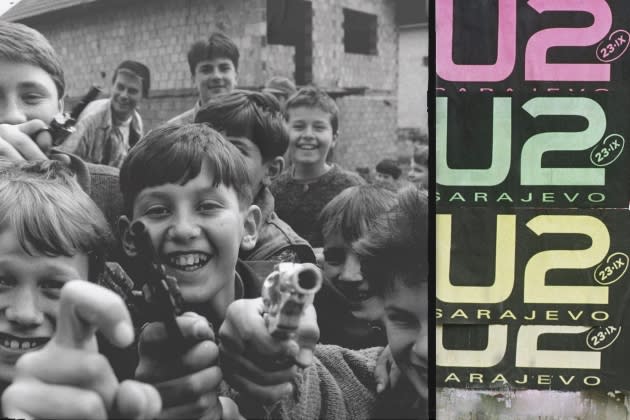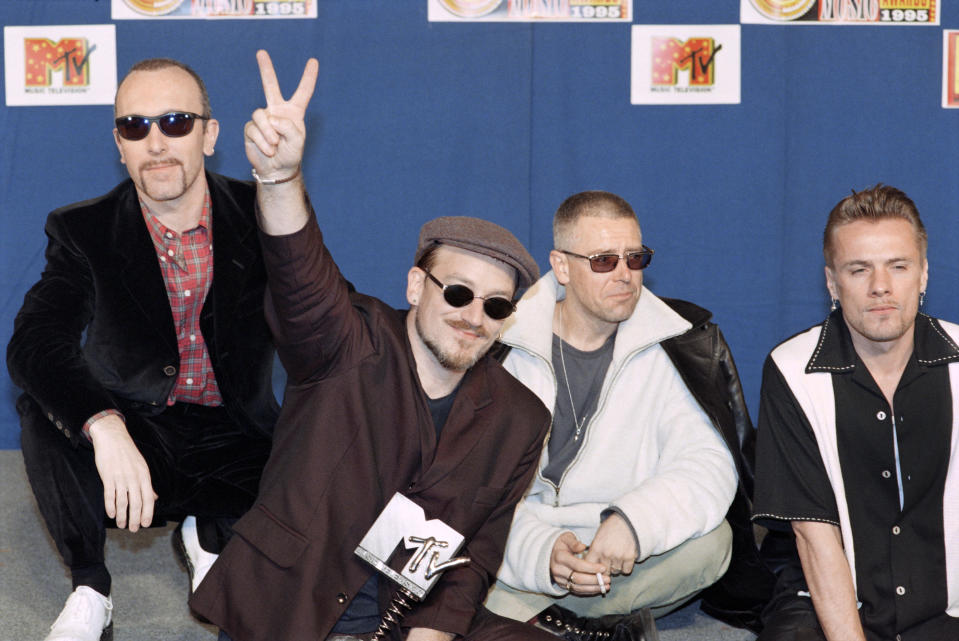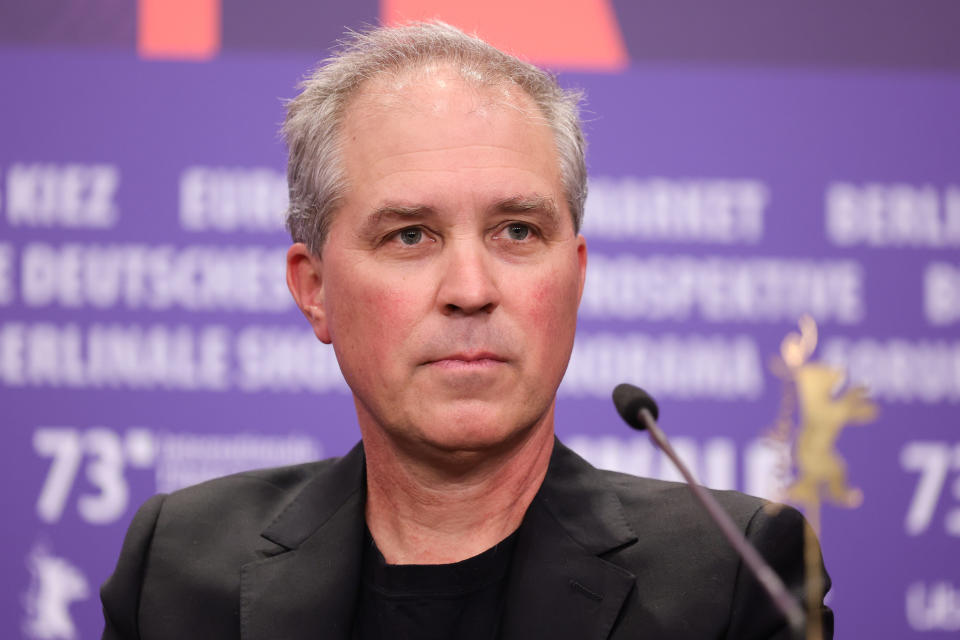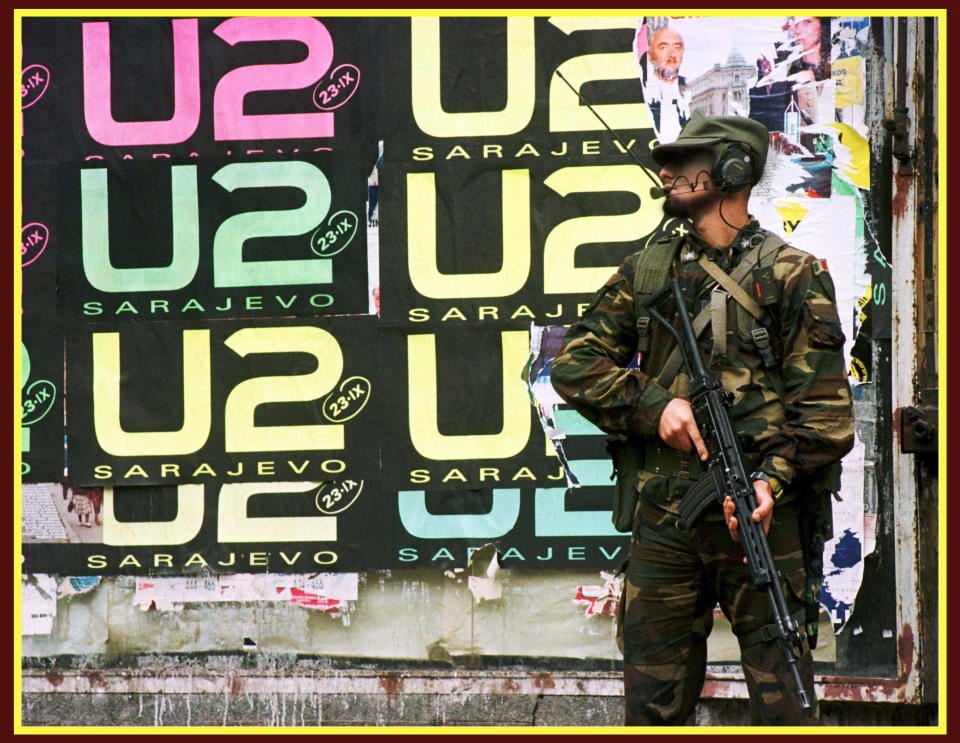Berlin Review: U2 Doc ‘Kiss The Future,’ From Matt Damon & Ben Affleck, Shows How Bono And Band Inspired Sarajevo Under Siege
- Oops!Something went wrong.Please try again later.
- Oops!Something went wrong.Please try again later.

For almost four years of siege in the 1990s, the city of Sarajevo concussed from shelling, the rumblings of armored vehicles and the repeated pop of sniper fire.
But in stolen moments, other more hopeful sounds broke through: music coming from underground clubs and through TV sets whenever electricity wasn’t interrupted. Songs like U2’s “Sunday Bloody Sunday” and “One.” The human need for the joy and release of music underpins the documentary Kiss the Future, which recounts how Bono and band took up the cause of Sarajevo. The documentary produced by Matt Damon, Ben Affleck, Sarah Anthony, and Drew Vinton and directed by Nenad Cicin-Sain made its world premiere tonight at the Berlin Film Festival.
More from Deadline
The film (a sales title at the Berlinale) takes us back to 1992 when Serbia, under the barbaric leadership of President Slobodan Milošević, embarked on a campaign of territorial expansion and ethnic cleansing in the wake of the dissolution of Yugoslavia as a state.
“It was ready made for trouble,” says former Pres. Bill Clinton in a fresh interview, describing the volatile situation in the Balkans. Another useful historical commentator in the film is CNN’s Christiane Amanpour, who made her reputation as a war correspondent reporting from Bosnia. She explains why the capital of Bosnia-Herzegovina – a place noted for the peaceful coexistence of Bosniaks, Serbs and Croats — became a target for destruction by Milošević.
“It was a very bright shining light, Sarajevo,” Amanpour observes, “and they needed to kill that.”

After setting the historical stage, Kiss the Future gets down to its real priority – showing how the people of Sarajevo responded to extreme deprivation and the constant threat of death. Much like what has been witnessed in Ukraine in the past year, Sarajevans needed not only shelter, water and food but some respite from war if only in brief intervals, and the energy to keep resisting. They found inspiration in music, and in particular in the songs of U2, then the biggest rock band in the world.
“It was kind of like teleporting to another place,” Enes Zlatár, front man of the band Sikter, remembers of what it meant to play and hear music. “That’s what kept us sane all the time.”
In one startling piece of archive, Sikter’s drummer, who lost an arm to shelling, is seen furiously banging away at a kit in concert, a drumstick duct-taped to the stump of his right arm. That tells you how much music matters.
Enes recalls feistily, “Our punk rock was our weapon to tell them, ‘Fuck you!’”
MTV, then the most powerful force in popular music, could be seen on TV in Bosnia. Sarajevans, we learn, revered U2 for their soaring music and outspoken stance on political issues. The Irish unit’s thrumming “Sunday Bloody Sunday,” written about the worst atrocity in the conflict over Northern Ireland when British troops mowed down unarmed civilians in 1972, resonated deeply with Bosnians facing annihilation.

“I thought they were a force for good,” says Bill S. Carter about U2. He wrote the documentary and plays an important part in it, recalling his memories of making his way to besieged Sarajevo in the early ‘90s as a young American, where he connected with an unorthodox NGO. He had only intended to stay briefly, but fell in love with the people, he explains. The central part of the film revolves around Carter’s efforts to contact U2 and Bono and to enlist their aid bringing attention to the plight of Sarajevo’s battered residents.
U2 was then playing its massive Zoo TV tour, in support of the album Achtung Baby. Remarkably, Carter overcame innumerable obstacles and layers of security to meet up with U2 on the Italian leg of their tour; he interviewed Bono, who sent a message of solidarity to the people of Sarajevo. And at their next concert, U2 dedicated a performance of “One” to the city.
“We thought the whole world had left us behind,” one Sarajevan remembers of the hope U2 stirred. “[It was] incredible somebody cared.”
Bono, The Edge and other members of U2 and their tour personnel and managerial teams are interviewed in Kiss the Future. Bono remembers proposing U2 head forthwith to Sarajevo to play a live concert, but the idea was ultimately deemed too risky. But on their Zoo TV tour stops in Copenhagen, Stockholm, London and elsewhere, they used a satellite hookup to beam in Carter and young Sarajevans for a live chat in front of huge stadium audiences. Those interchanges clearly left Bono moved, but on one occasion a Bosnian woman on the live feed told the band straight up that despite the gesture of solidarity, “You’re really doing nothing for us.”
It was a reality check that despite a few feel-good moments, the West in general had at best paid lip service to the suffering of Bosnia and Sarajevo. Milošević was getting away with bloody murder.
After that public rebuke, U2 dropped the “live from Sarajevo” interludes from the tour dates. “It wasn’t producing a groundswell,” Bono offers, saying it had become a tired “reality TV” exchange, “using people’s pain as entertainment.”
They weren’t done with Sarajevo, however. They would go on to write, with Brian Eno, the song “Miss Sarajevo,” inspired by a beauty pageant held in the city in the midst of siege, where young contestants in bathing suits held a banner that read, “Don’t Let Them Kill Us.” Luciano Pavarotti sang an operatic section of the tune.
The film shows that the massacre in Srebrenica in 1995, when Serbian forces executed more than 8,000 Bosniak Muslim men and boys, shamed the West into retaliatory action. A four-day NATO bombing campaign changed everything. Amanpour comments of Milošević’s forces, “They folded in a second.” The siege of Sarajevo soon ended.

Kiss the Future succeeds on several levels – as an important reminder of a terrible genocidal war that has been largely forgotten, and as a sort of time capsule, recalling an era when the “news feed” satellite link up that U2 implemented for Zoo TV tour constituted a novelty, and MTV reigned as the supreme arbiter of youth culture. But it speaks, crucially, to the present when civilians in Ukraine are being targeted just as mercilessly and cruelly as were the people of Sarajevo. Ukraine’s citizenry, as they struggle for sustenance and heat in a cold winter, continue to make art and to need music in a similar way to the stirring scenes in Cisin-Sain’s film. Ukraine’s classical musicians have played in underground shelters, a gesture of hope and resilience, and a humane and ennobling act that contrasts forcefully with the exterminating enterprise of Putin.
The documentary builds to U2’s triumphant arrival in Sarajevo after the breaking of the siege. They play before tens of thousands of ecstatic fans in an arena; one man remembers almost 30 years on, “The war ended the moment they went on stage.”
Bono, temporarily losing the exceptional tenor voice that made him one of rock’s greatest vocalists, manages to holler to the crowd, “Viva Sarajevo!” He shouts, “Fuck the past! Kiss the future!”
Best of Deadline
Sign up for Deadline's Newsletter. For the latest news, follow us on Facebook, Twitter, and Instagram.

